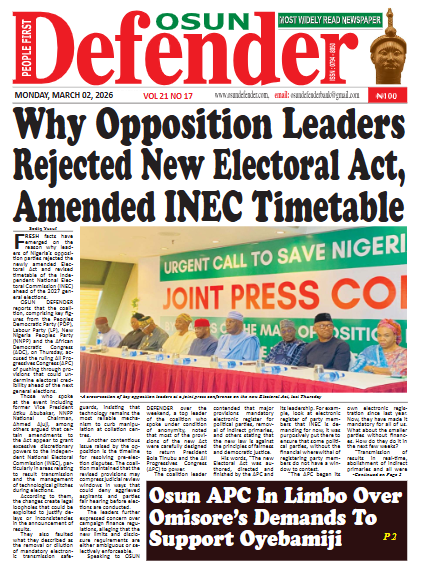Aregbesola Raises Concern Over Growing Wealth Disparity in Nigeria

- Advocates Return To Parliamentary System of Govt
Former Osun State governor and immediate-past Minister of Interior, Ogbeni Rauf Aregbesola, has expressed deep concerns over the widening wealth gap in Nigeria, warning the country’s growing wealth gap poses serious risks.
Speaking on Nigeria’s economic climate, Aregbesola bemoaned how economic inequality has worsened over the years.
He said wealth is now concentrated in the hands of a few, leading to significant hardship for many citizens, a development that contrasted sharply with his formative years when wealth was more evenly distributed.
Aregbesola spoke at the National Dialogue on Home-grown Parliamentary System, on Monday, in Abuja.
Other panelists at the event were the erstwhile Speaker of the House of Representatives, Yakubu Dogara, and Minority Leader, Kingsley Chinda.
According to Aregbesola, fewer Nigerians are now able to prosper, even though prosperity itself has not disappeared from Nigeria, adding that this wealth imbalance “signal deep” trouble for the nation.
“When I was born and during my developmental years, wealth was not as limited to the hands of a very few people as it is today. What does that tell us? It tells us that we are in deep trouble. We would not be here discussing this if things were normal in Nigeria.”
READ: Parliamentary System Is Best For Nigeria – Aregbesola
Aregbesola attributed some of these issues to an executive system of government, which he believes is ineffective for a populous and diverse nation like Nigeria.
Instead, he strongly advocates for a shift toward a parliamentary system, arguing that this model would foster a more collaborative approach to governance and ensure broader representation across Nigeria’s regions and ethnic groups.
According to Aregbesola, a parliamentary system could mitigate this risk by promoting a governance structure that decentralizes power and reduces the dominance of any single individual or office.
“If we go on believing that one person, no matter how capable, has the capacity to govern over 220 million Nigerians alone, without checks, we are kidding ourselves. By that alone, I am opposed to the executive system of government. I believe in a collective arrangement, which the parliamentary system best supports for a nation like ours.”
He further reflected on Nigeria’s colonial past, suggesting that centralized executive power has historically left the nation vulnerable to authoritarian rule.
“There was a weakness that led to our colonialism in the first place; it was a weakness. If you are strong enough, you wouldn’t be colonised. Part of it is these individual dictators we call rulers,” he said.
Aregbesola also warned that if citizens continue to feel excluded or denied their rights, there could be serious consequences, including potential revolt.
“Whatever does not give appropriate opportunity or rights to the people will be resisted no matter what you do,” he cautioned. “If other things fail, people can revolt. If we are conscious of all this and understand the consequences of things getting out of hand, we would be interested in finding the best ways to govern ourselves.”
Osun Defender recalls that last February, a group of House of Representatives members sponsored a bill seeking an amendment to the 1999 Constitution to transition from the presidential to a parliamentary system of government.
According to the group of about 60 lawmakers, the transition has become necessary to reduce the cost of government in the face of dwindling revenue.

Hafsoh Isiaq is a graduate of Linguistics. An avid writer committed to creative, high-quality research and news reportage. She has considerable experience in writing and reporting across a variety of platforms including print and online.








